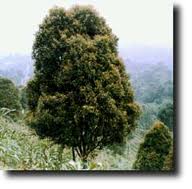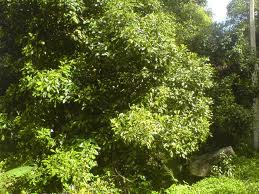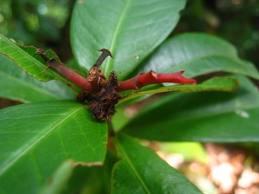
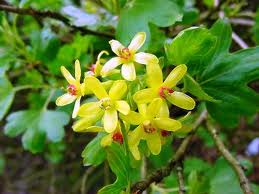
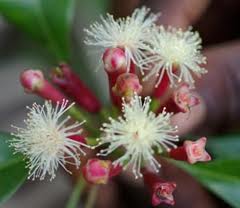
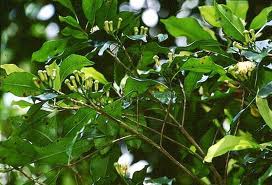
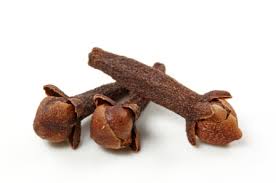
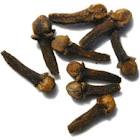
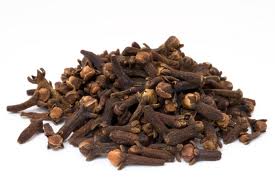
Cloves
Cloves are aromatic dried flower buds of Syzygium
aromaticum (also known as Eugenia caryophyllus) The spice
originated in Indonesia and is used in cuisines all over the
world.
Cloves were introduced in India in
Courtallam of Tamil Nadu around the year 1800 AD, by the East India
Company. Their initial success encouraged them to extend the
cultivation of cloves to Nilgiris, southern region of the erstwhile
Travancore State and the slopes of Western Ghats.
Nilgiris, Tirunelveli, Kanyakumari,
Nagercoil and Ramanathapuram districts of Tamil Nadu; Kozhikode,
Kottayam, Kollam and Thiruvananthapuram Districts of Kerala and the
South Kanara district of Karnataka are the important clove
producing regions in India.
According to estimates, the total
area under clove cultivation in India spreads over an area of
around 2000. While Kerala accounts for nearly 1000, it is around
750 hectares in Tamil Nadu, and around 175 hectares in Karnataka
and 75 hectares in Andaman and Nicobar islands. Clove plantations
in India are believed to have originated from seedlings originally
obtained from Mauritius.
The other important clove producing
countries in the world are the islands of Zanzibar and Pemba (now
in Tanzania), Indonesia, Madagascar, Sri Lanka and Malayasia. The
world production of clove is estimated to be around 1,00,000
tonnes.
Although India is an importer of
cloves and the production within the country being consumed
domestically, exports of cloves, probably for the first time,
exceeded 700 tonnes during the first quarter of the current fiscal.
Almost the entire quantity went to Indonesia via Malaysia/Singapore
traders
The clove tree grows to a height of
8–12 m, has large leaves and sanguine flowers in groups of terminal
clusters. The flower buds are pale color initially but gradually
turn into green,and later when they are ready for harvesting, they
become bright red, At the time of harvest they are about 1.5–2 cm
long,
The trees starts to yield in about
five years and two to four crops are harvested each year. Although
clove-trees have a life span of around sixty to seventy years, some
said to last even ninety years or more, the average life of a clove
plantation will not exceed more than twenty years. Cloves are used
in Asian, African, and Middle Eastern cooking for adding flavor to
meats, curries, and meat marinades.
The history of
cloves
Cloves
have a history that date back 2500 years in ancient China. it is
believed that during this period, cloves were not only used in
cooking but also used in perfumes, medicines and as breath
fresheners.
As Cloves were very expensive and
coveted among spices. A number of wars have been fought, especially
among Europeans, to gain control over the clove trade. The Dutch
who were desperate to gain control over the clove trade, burnt down
all the clove trees in the region except those that grew on islands
controlled by them. As this led to revolt by the natives of these
islands, it became a tradition to plant a clove tree at the birth
of every child on the islands and the fate of the child was
considered to be linked with that of this clove tree.
Uses
Cloves are said to
be an effective ant repellant
Cloves and Clove
oleoresin are used by food processing industries for various
preparations.
Clove oil is used in
perfumeries, pharmaceuticals and flavouring
industries.
Cultures around the
world have found clove to be effective in medicinal uses. Cloves
are traditionally being used in Indian Ayurvedic medicine. Chinese
medicine and Allopathic medicines use cloves to treat digestive and
stomach disorders and dentistry where clove oil and whole cloves
are used to relieve toothache. Dentists use clove oil in their
fillings, anaesthetics and mouthwashes.
Cloves are
considered to be a rich source for several vitamins and minerals
including manganese, Vitamin C, calcium and omega-3 fatty
acids.

